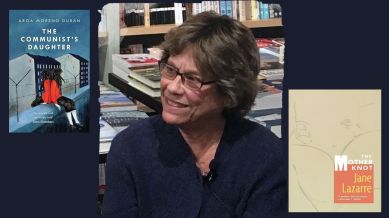Jane Lazarre, writer who redefined motherhood, dies at 81: Three books to remember her by
A white Jewish woman and the daughter of Communist intellectuals, she was also the mother of two Black sons, which gave her a unique insight into the socio-political issues plaguing USA.

American memoirist and essayist Jane Lazarre, known for her nuanced explorations of motherhood, race, and political identity, passed away on June 19 at her home in Manhattan. She was 81.
The cause was liver cancer, her son Khary Lazarre-White told the New York Times.
monthly limit of free stories.
with an Express account.
Over five decades, Lazarre built a formidable body of work that challenged prevailing myths of American liberalism. A white Jewish woman and the daughter of Communist intellectuals, she was also the mother of two Black sons, which gave her a unique insight into the socio-political issues plaguing the United States of America.
Her writings blurred the lines between personal reflection and political critique, confronting dominant narratives about feminism, whiteness, and family life. Lazarre’s works found audiences in the US, the UK, and across Europe, with translations in German, French, and Spanish. She taught writing and literature for over 40 years at the City College of New York, Yale University, and Eugene Lang College at The New School.
She is survived by her husband of 58 years, Douglas Hughes White, an attorney and civil rights activist; her eldest son, Adam Lazarre-White, an actor, teacher, writer, and producer; and her youngest son, Khary Lazarre-White, an attorney, novelist, activist, and co-founder and Executive Director of The Brotherhood Sister Sol.
Here are three of her influential works:
The Mother Knot
Undoubtedly her most popular work, this memoir, first published in 1976, has been dubbed a feminist classic. In its pages, Lazarre dismantles the idealised notions of motherhood and the myth of the “good mother.” She paints a fiercely honest portrait of early motherhood as a time of profound upheaval, filled with desperation as well as joy, the struggle to reclaim a sense of self, and sheer physical exhaustion. She confronts the emotional contradictions and psychological toll of raising children in a culture that demanded self-erasure from mothers.
Beyond the Whiteness of Whiteness: Memoir of a White Mother of Black Sons
A moving account of Lazarre’s experiences raising Black children as a white woman, this book, published in 1996, examines structural racism and the myth of colorblind liberalism in post–civil rights America. “I am Black,” Jane Lazarre’s son tells her. “I have a Jewish mother, but I am not ‘biracial.’ That term is meaningless to me.” This is a powerful meditation on motherhood and racism in America. She writes about learning to understand the experiences and realities of her African American husband, their sons, and their extended family. Lazarre emphasises that though racism and white privilege lie at the heart of American history and culture, it is not beyond us to empathise.
The Communist and the Communist’s Daughter
In The Communist and the Communist’s Daughter (2017) Jane Lazarre intersperses memories of her father, with documentary materials, including his massive FBI file, to tell her father, Bill Lazarre’s fascinating history as a communist, a Jew, and a husband, father, and grandfather in America. In a letter to his newborn grandson, Bill Lazarre wrote “unfortunately, despite the attempts by your grandpa and many others to present you with a better world, we were not very successful.” This is her final major work, where she explores the legacy of her father who was born in 1902 amid the pogroms in Eastern Europe and dedicated his life to working for economic equality, racial justice, workers’ rights, and a more just world. A single father, he was dedicated not just to his cause, but his family, especially his daughters.